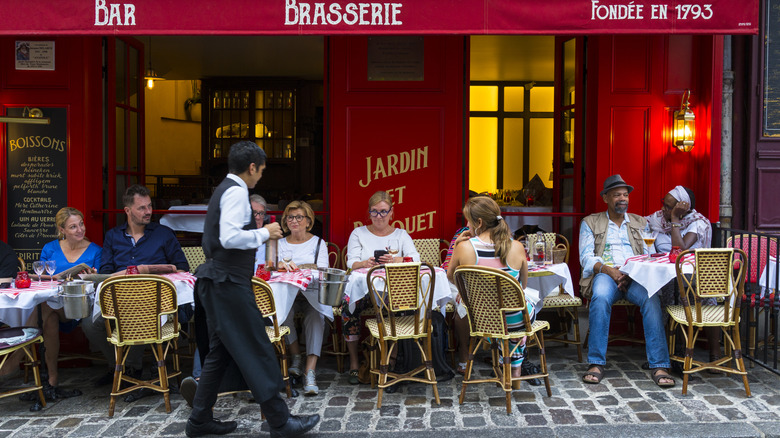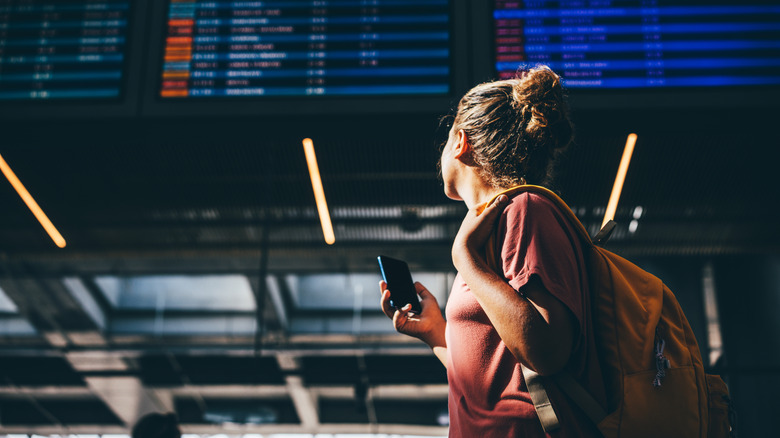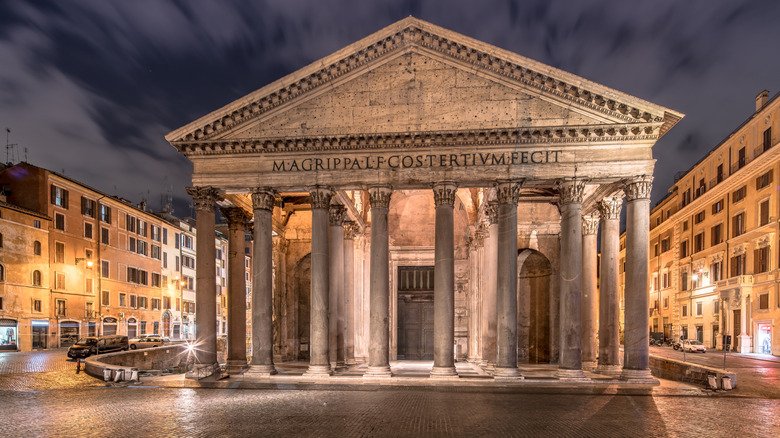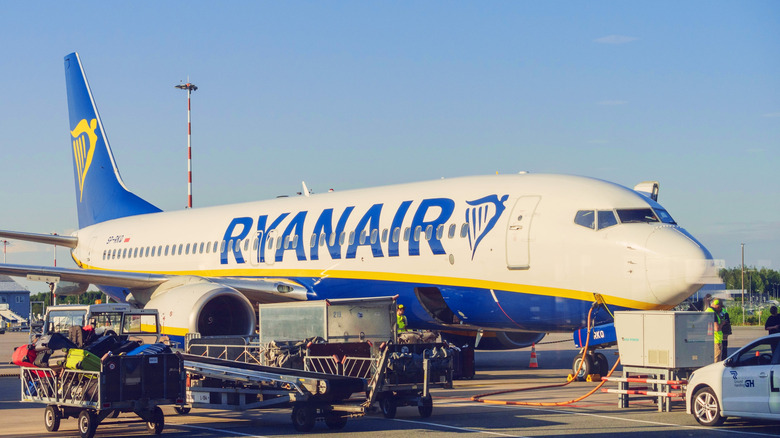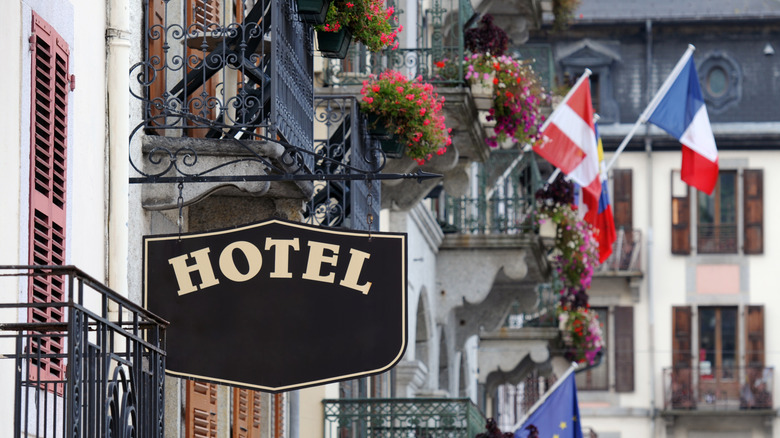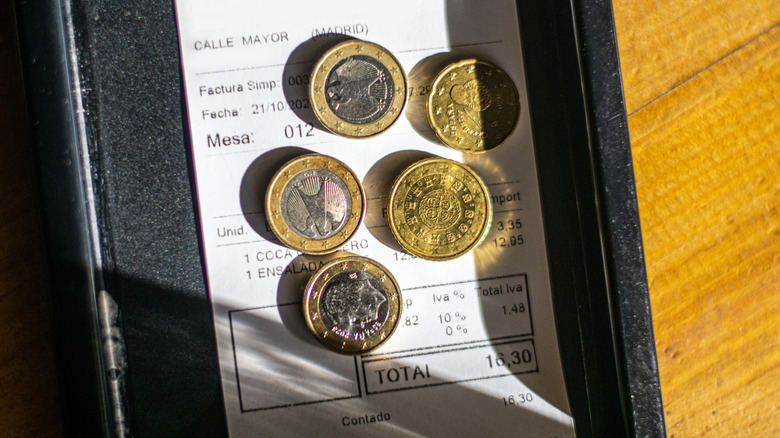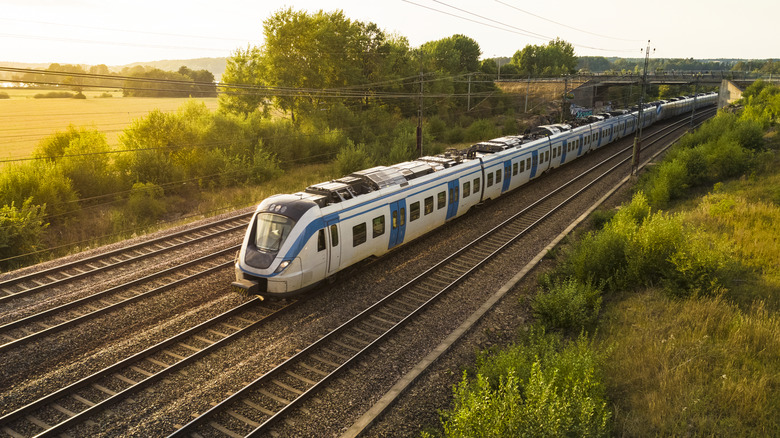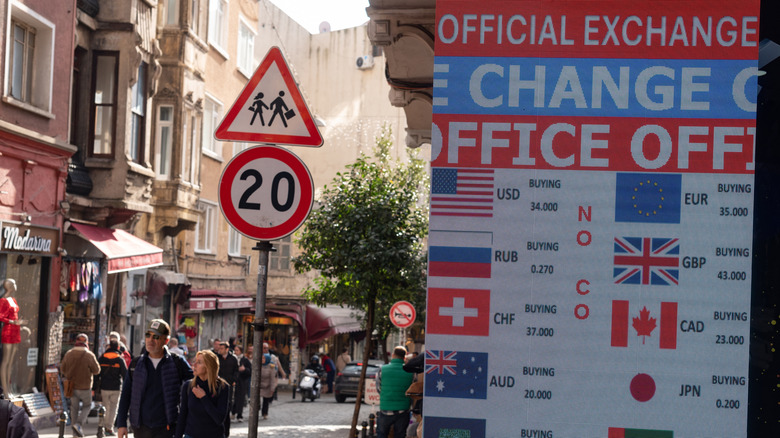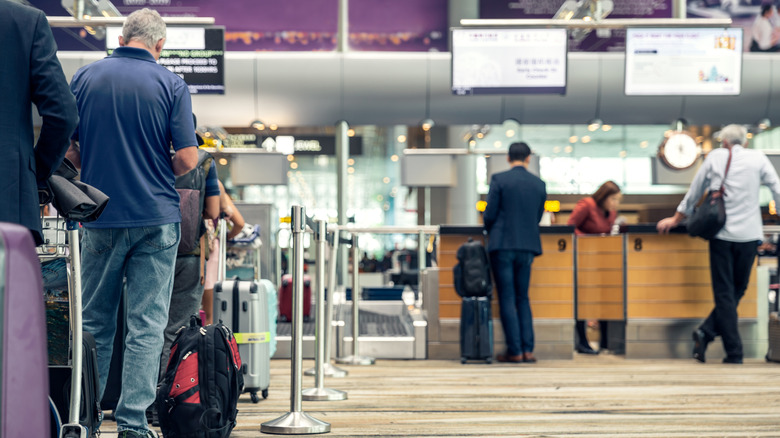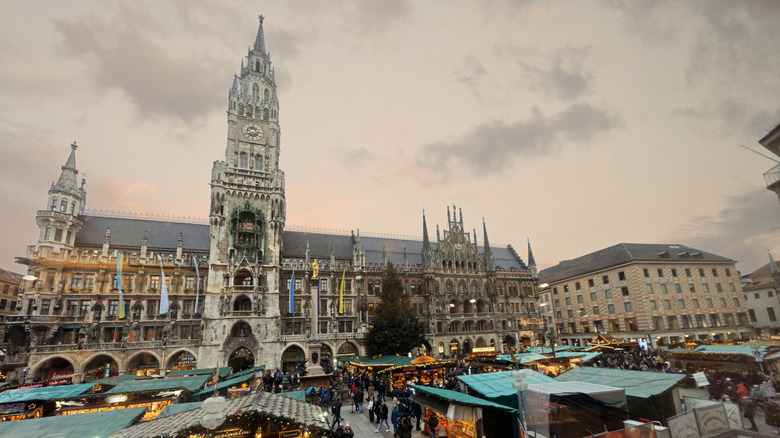10 Thrifty Tips For Making Travel More Affordable In 2026, According To Rick Steves
Travel has never been more popular. Unfortunately, it's also never been more expensive. From eye-watering airfares and hotel rates to tourist trap restaurants and swindling souvenir salesmen, it's easy to see your budget decimated in just a few moves. Those expenses are putting travelers off some destinations, fearing they're well outside their budget.
But all is not lost. There are still tons of tricks that can help you pinch the pennies and use them on the stuff you really want to do, and make those pricey destinations a lot more palatable on your purse strings. Rick Steves has been at the forefront of travel for the past three decades, specializing in how to make the most of all your European travels. In that time, he has built an arsenal of money-saving tips to complement his experiential advice, and with 2026 expected to be just as expensive, there's never been a better time to take his word for gospel.
I've been traveling full-time for the past six years, living for at least a month in over 45 countries, and can vouch for Rick's tips. I've curated some of his best money-saving ideas in this article, and backed them up with my own anecdotes from around the world. From simple dining decisions to tactical bookings, here are some thrifty tips for making travel more affordable in 2026.
Avoid touristy restaurants
Touristy restaurants are successful for a reason. They're conveniently placed, they'll have a version of all the local food you have on your list, and they'll have their best salespeople out front, luring you in with a welcoming spiel. However, they're also bumping prices astronomically compared to what the locals would pay — and often with far less quality.
Rick recommends avoiding touristy restaurants like the plague. He notes that his tourist-restaurant-radar goes off when he sees a "We speak English" sign and massive multilingual menus on the tables. I'd also throw in to be wary of oversized menus and suspect additions to the menu, which are often built to please foreigners. Think chicken Alfredo in what seems like an "authentic" Italian place in Rome. Generally, where the locals eat will be cheaper, better quality, and they'll have true specials. Those specialties should almost always guide your choices.
In my time traveling, I tend to stick to the "three block rule," in which I generally don't bother looking for restaurants within three blocks of a major tourist attraction. Try it yourself, and you'll often find that after three, the crowds suddenly disperse, and the rates drop considerably. There are exceptions, of course, such as when I've been strongly recommended to visit a specific place, but for general wanderings, that's my rule. And don't be scared to ask locals these simple questions to find affordable dining options — that's how you find the gems.
Open jaw travel
Don't worry, open-jaw travel has nothing to do with the dentist — although flying to Europe for a check-up might be cheaper than in the U.S in some cases. An open-jaw flight can save money in your budget by simply having you fly into one airport and fly out of a different one. It's named that because if you draw a line between each airport in the direction of travel, you'll be left with a triangle shape that, you guessed it, kind of resembles a crocodile's open jaw.
Rick Steves recommends this for a couple of reasons. Firstly, it's often cheaper and secondly, it's far more convenient. Imagine an itinerary where you fly from New York to London, then enjoy a little European trip before flying back. Booking a round-trip would mean you'd need to get back to London from wherever you finished your trip — let's say Munich. That's an extra leg of travel through what can be an expensive city. Instead, book a one-way flight to London, get to Munich via a budget airline, or work your way through Europe with trains and buses, then fly back to New York from Munich.
I do this all the time when I'm visiting multiple places on one trip. Even on a simple itinerary through the U.K. and Ireland, where I'm visiting London, Edinburgh, and Dublin, I'd fly into London, take the train to Edinburgh, grab a cheap flight or ferry to Ireland, and then fly back to the States from Dublin. Most airlines let you book open jaws in the same itinerary, so you don't even need to separate the bookings, but you can do so for even more savings.
Travel off-season
Off-season and shoulder-season travel are touted all the time, yet many tourists opt to blow their vacations in the busy months, severely impacting their trip. Just take a look at the videos of Amsterdam's crowded streets in the middle of summer. It's hell. I understand that some may be limited in when they can take time off, but if you have the flexibility, take Rick's advice and travel during the off-season.
The benefits of off-season travel are numerous, especially in cities and destinations that aren't dictated as much by the weather. Take London, for example. The Big Smoke's summer weather is unpredictable at the best of times, and its early winters or late falls are sometimes only a few degrees colder. The attractions are the same, the crowds are thinner, the prices are cheaper, and it potentially opens you up to much better experiences. According to Rick, the off-season is the best time for a vacation to Italy, too.
While traveling, I've found myself in many destinations in the off-season, like Dubai in summer (very hot but very empty), Rome in October (had the Colosseum to myself), Prague right before the Christmas rush (all the magic, none of the elbowing), and Paris in November (a gray, drizzly Paris is the most romantic Paris). Of course, it can come with trade-offs, especially in destinations that you'd want a bit of sun, like a Greek Island or Southern Spain, but for most major cities, the off-season is just another opportunity to experience it in a more authentic way.
Don't be tied to points (and don't be scared of budget airlines)
Points and miles are the ultimate hack to cheap (or even free) travel. I've utilized them (and written about them) for the last four years, covering an average of $10,000 a year in flights and hotels between my partner and me. But despite that reliance, I still don't let myself become tied to my earnings at the expense of a good deal. Rick Steves agrees and is a proponent of booking the cheapest or best flight in any given scenario, regardless of the points potential.
The reality is that unless you fly regularly, the points you earn from any given flight are unlikely to trump the savings you'll find by opting for a better deal. Think about it this way: If you're a Delta fan and have managed to become a Diamond elite status member, you'll earn 11 SkyMiles per dollar. If you buy a flight worth $800, you'll earn 8,800 miles. I put the value of a SkyMile at around 1.2 cents (which isn't good, by the way), meaning 8,800 SkyMiles are worth $105. Meanwhile, another airline has the same route priced at $500. If you opt for the Delta flight, you're still putting yourself $200 out of pocket.
At the very least, do the math before you opt for your favorite airline. If money-saving is your goal, it's not a great habit to form. I put all my travel spending on a general credit card that earns transferable miles. That way, my day-to-day spending earns me points that I can use when it makes the most sense. And don't be scared of budget airlines either. It might not be as good an experience, but $300 cheaper for the same trip is a good deal.
Be smart about hotel choices
Here's a controversial take: A cool hotel won't make your trip amazing. Sure, a terrible one can ruin it, but most tourists put too much weight on their choice of hotel, especially with a packed itinerary. If you're pinching the pennies, it's time to start viewing hotels for what they are — a place to rest your head at night. It should be safe, comfortable, and well-positioned to let you explore with ease. Beyond that, you don't need the bells and whistles. Rick Steves also advises against room and board deals, as they keep you away from locals.
Rick's thinking is similar, and he believes that a three-star hotel with a 24-hour concierge and room service is unnecessary if the traveler is happy to stay in a one-star property. The simple option serves its purpose and puts money back in your pocket. Of course, if the luxuries matter to you, then go for it, but you'll always be paying a premium. Do what you can to check the room first, too. Like touristy restaurants, some hotels put on an excellent show of high-end draws but let customers down once they're in and paid. In many cases, the opposite happens at cheaper places. A delightful little B&B run by a pair of locals could make your trip half the price.
Don't dismiss hostels either. Private rooms in hostels, while getting more expensive these days, can still be a fraction of the price of a hotel. If you can cope with the toilet being down the hall, you can save tons. I've fallen back on hostels multiple times to save money, including a month-long stint in Ecuador, paying just $400 for 30 nights, cooking my own food in the communal pantry, and making brilliant friends in the process.
Don't overtip
This is a hard one for many Americans, but over-tipping is costing you money you didn't need to spend, and you might even be hurting the local tourist industry. As Rick states, the customary 15 to 20% in the States is substantially more than almost any country in Europe or elsewhere would expect. In many places, it's not expected at all. In Japan, it's sometimes viewed as an insult. Wherever you are, whether in China or Italy, it pays to understand how tipping works.
The pay structure in other countries is different, with European servers typically paid a full wage by the hour or on a salaried basis. There's a good chance that your generous tip won't even go directly to the server. It's likely thrown into a pot and divvied out at the end of the month. Be especially careful of tipping in tourist spots, as service charges and other sneaky fees may have already been tacked onto your bill.
The darker side of tipping is that it can actually foster a bit of a toxic environment. In a city where tipping isn't expected, Americans forcing their own habits can become the norm. Touristy spots that are happy to take advantage often start holding other Americans and nationalities to the same standards, and in some cases can become frustrated or hostile when those expectations aren't met.
Make the most of public transit (and swing second class)
Public transport in a foreign country can be intimidating, especially if you come from one of America's sprawling highway-connected cities or a smaller town. However, Rick Steves says that using public transport is one of the best ways to save money. I fully agree, and opt to use public transport as much as possible.
Taking a little time to research your destination's transportation options can go a long way in preparing your budget. Take landing at Heathrow, for instance. Jumping in one of London's iconic black cabs could set you back up to £120 ($163). The Heathrow Express can cost as little as £10 and get you there in 15 minutes, while the Elizabeth or Piccadilly Lines can be even cheaper. A little prior research could save you over £100 within half an hour of touching down. Similarly, in France, the metro is the best way to get around Paris without spending all your euros.
Opting to use public transport is also an immersive way to see the city. It's how the locals do it, and it can help you stumble into new spots you might not have visited before. Above all, it's convenient and cheap. Many cities also offer day or week passes, allowing you to save even more on a longer trip. And don't splash on first-class train seats. It's the same train; you're just throwing money away.
Be wary of exchange bureaus
Exchange bureaus are a frustrating thing in the modern world. While still useful when you have to change some currency, the vast majority of travelers from the U.S or Western Europe can almost always use their debit or credit card at an ATM for a better rate with more convenience. The days of the exchange bureau are surely numbered.
The issue with these businesses is the profit margins that many try to achieve. Rick Steves warns that before approaching any bureau, you should make sure it displays the buy and sell rates for your currency, as well as any processing fees or taxes they may put on top. If these are not shown, there might be some trickery afoot, and you'll find yourself surprised by the small amount of cash you now have. Do what you can to familiarize yourself with trusted names, and ensure the profit margins never stray beyond 5% for the bureau. Anything above is a terrible deal.
I have used an exchange bureau maybe twice in the last three years. My credit cards have no international fees, my debit card doesn't either, and I generally narrow down how much currency I have left and use it before leaving the country. I'll try to research the best banks and ATM vendors for foreign fees, as some can be bad, but I'll usually find one that I can rely on. Just make sure you always select the local currency when withdrawing and not the dynamic rate. Cash is still king in many places, but cards are now the dominant payment method in most major cities in Europe and Asia.
Picnics save money
If you're a big-time foodie and want to blow your cash on the best food your destination has to offer, I fully support you. It's one of the best things about travel. But if you're visiting somewhere for other aspects, are trying to save, and can live without three courses and a bottle of wine each night, then get creative. As Rick Steves rightly states, $10 is enough to buy a solid picnic for two anywhere in Europe.
If you're in a hostel, you have even more scope to cheapen things by buying pasta and fruit, effectively taking your food bills for a week down to a few bucks. Every destination has its cheap options. I've sat by the Seine with a crusty baguette, some cheese, and a cheap bottle of wine, and I've lived off 20-cent pot noodles in Shanghai. A cheap favorite in the U.K. and an amusing part of culture there is the endless battle between supermarkets for meal deal supremacy. Generally, you'll get a sandwich, a drink, and a bag of chips for about £3.75. The customer wins, every time.
I'd always recommend trying to get out to restaurants, but if your budget is tight, this is by far one of the best ways to help keep things in check. This is doubly true if you don't really care too much about food. If you've got tunnel vision on seeing every museum in Madrid and Barcelona, you're not going to remember the cheap pastries you sustained yourself on. For everyone else, use it to save a little, then splurge on dinner at somewhere special.
Avoid travel agents but use combo deals
This tip falls back into the convenience versus cost argument. Travel agents and room-finding services are great for taking the pressure out of your trip planning, but they can wind up far more expensive than if you did it yourself. Most of the time, these services take a fee, don't show you the full breadth of pricing available to you, and can corner you into a bad deal without you even realizing it.
Rick advises travelers to take things into their own hands, finding hotels and experiences in guide books, through recommendations, and via online review sites. Once you've found the place you want, book direct. By doing this, you'll often find better rates, clarify things about the hotel, and sometimes even enjoy add-ons like breakfasts or upgrades, depending on availability. Travel agents won't have access to that information, and adding an intermediary will almost always see you end up worse off.
I've only used travel agents twice in my time traveling, and both times I was frustrated to meet others who paid less, received more, and had a better relationship with the vendors. I do, however, use combo flights. Using sites like SkyScanner, where you can combine one-way flights from different airlines and even separate different legs, can save a significant amount of money.
Methodology
This article was built around Rick Steves' recommendations for saving money while traveling, many of which were published in a 2021 article on his website. These tips and tricks were then backed up using my own experiences as a full-time traveler over the past six years.

